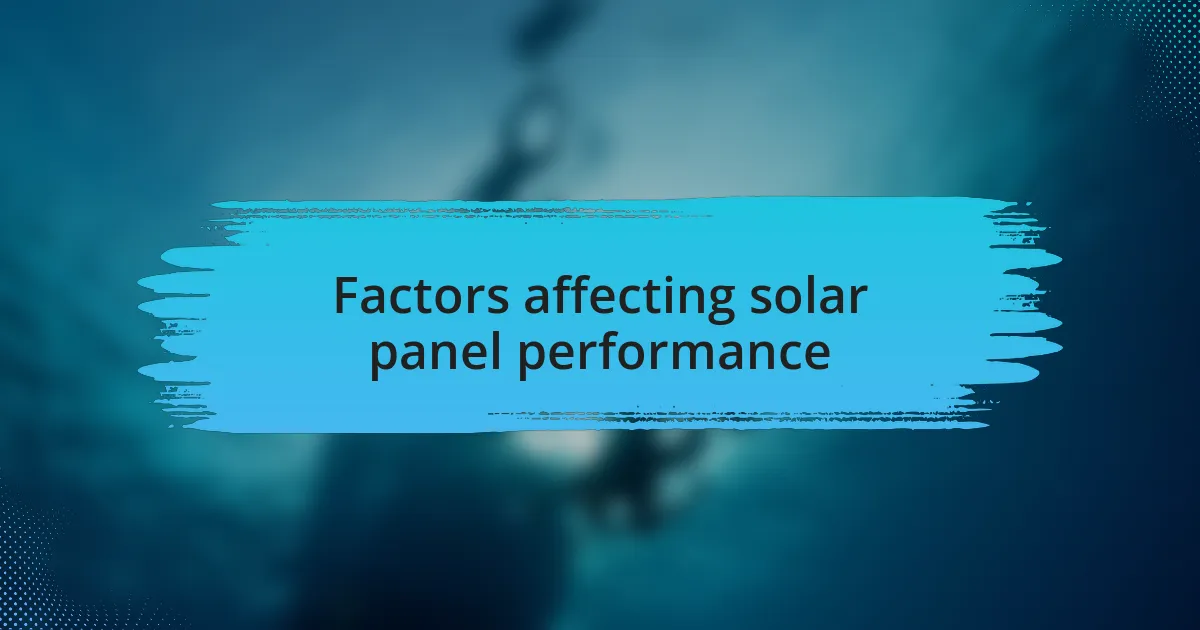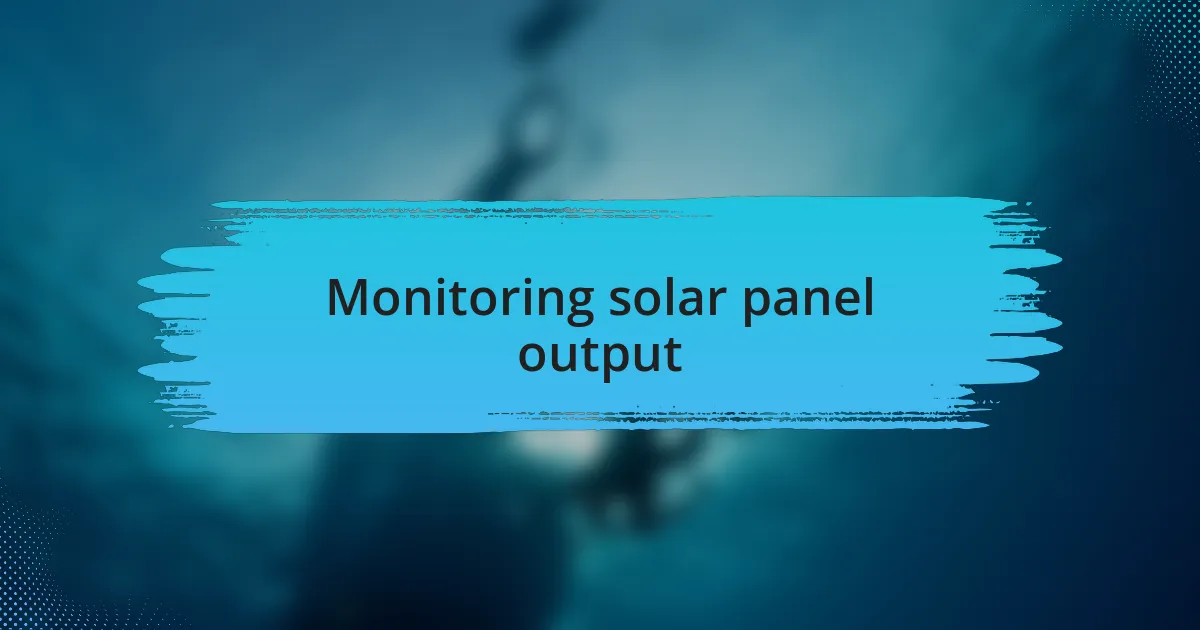Key takeaways:
- Upgrading to monocrystalline solar cells significantly improves energy output, even in less-than-ideal weather conditions.
- Factors such as shading, temperature, and panel orientation greatly affect solar panel efficiency and should be optimized for better performance.
- Regular monitoring of solar output and maintenance, such as cleaning panels and checking connections, is essential for maximizing energy generation.
- Making small adjustments in panel positioning and minimizing shading can lead to substantial gains in energy efficiency on luxury yachts.

Understanding solar panel technology
Understanding solar panel technology is essential for maximizing efficiency, especially on luxury yachts. I remember the first time I stood on my yacht, soaking in the sun, and realized that these sleek panels were more than just a design element; they were a gateway to sustainable power. Each solar panel operates by converting sunlight into electricity through the photovoltaic effect, where photons excite electrons, generating an electric current. Isn’t it fascinating to think that the energy powering my luxurious experiences comes from the sun?
Delving deeper into the technology, I’ve learned that the quality of solar cells can significantly impact performance. When I upgraded my panels to monocrystalline cells, I noticed a remarkable difference in energy output, even on cloudy days. The efficiency of these panels, typically around 20% or more, can make a substantial difference. How does that sound for keeping your yacht’s amenities running smoothly while minimizing reliance on traditional fuel sources?
Additionally, understanding other components like inverters and battery storage has revolutionized how I manage energy on board. I’ll never forget the time my yacht’s inverter failed, leaving me with a sinking feeling—literally—right before a weekend trip. Since then, I’ve ensured that I have a reliable inverter and ample storage to maintain power even when the sun sets. Isn’t it incredible how far technology has come, allowing us to embrace both luxury and sustainability?

Factors affecting solar panel performance
Factors affecting solar panel performance can be surprisingly multifaceted. For instance, I once anchored my yacht in an idyllic cove, only to realize that the surrounding trees blocked the sun’s rays. It left me pondering: how often do we overlook the impact of shading? Even a small obstruction can lead to a significant drop in energy output, drastically affecting how much power I can harness on board.
Another crucial element is temperature. I vividly recall a hot summer day when my panels were too warm, causing their efficiency to decline. This effect is all too real; as temperatures rise, the photovoltaic cells can struggle to produce their best performance. It made me rethink my installation position, as I now favor angles that help minimize overheating. Have you ever considered the way heat affects your solar setup?
Finally, I learned that the angle and orientation of the panels play a vital role. After engaging in some trial and error, I found that adjusting my panels to maximize sun exposure throughout the day made a world of difference. It’s a simple yet pivotal step that ensures my yacht benefits from the optimal solar capture possible. How else can small adjustments lead to significant gains in energy efficiency?

Monitoring solar panel output
Monitoring the output of my solar panels has been a game changer for my yacht energy management. I invested in a reliable monitoring system that allowed me to track energy production in real time. It’s fascinating to see how different factors, like weather changes, impact my energy levels throughout the day. Have you ever seen your energy usage dip unexpectedly? Spotting those trends firsthand helped me adjust my usage patterns, making my off-grid living more efficient.
One instance that stands out is when I noticed a sudden drop in output during a clear day. After a bit of investigation, I found that accumulated dust on the panels was to blame. Cleaning them regularly became not just a chore, but an essential routine—almost meditative in a way. It’s funny how something as simple as dirt can lead to significant losses in energy. How often do you check on the health of your solar system?
Additionally, I found that integrating my solar output data with my onboard management system was vital. By analyzing the data over time, I could predict energy availability and make informed decisions about when to run power-hungry appliances. This foresight not only enhances my comfort on the yacht but also minimizes any reliance on backup generators. Isn’t it empowering to take control of your energy consumption like that?

Personal experiences with optimization
Once I started fine-tuning my solar panel performance, I discovered the importance of angle and positioning. I made it a point to adjust the tilt of my panels according to the sun’s trajectory. It was revealing to see how just a few degrees could significantly boost my energy capture. Have you ever felt that thrill when new insights lead to better results? It’s like finding hidden treasure in plain sight.
Another memorable experience was when I experimented with shading techniques. I noticed some sections of my panels were affected by the shadow of the mast. By restructuring the layout of furniture and sails, I managed to minimize shading. The sense of accomplishment I felt when I saw an uptick in power generation was indescribable. How often do you take the time to experiment with your setup?
I also made a habit of regularly checking the connections and wiring of the solar system. One day, I discovered a loose connection that was hindering performance. Fixing it turned a frustrating moment into a rewarding triumph. The feeling of being proactive about my yacht’s energy system highlighted how small, meticulous actions can lead to significant improvements. Don’t you enjoy that feeling of turning potential setbacks into opportunities?